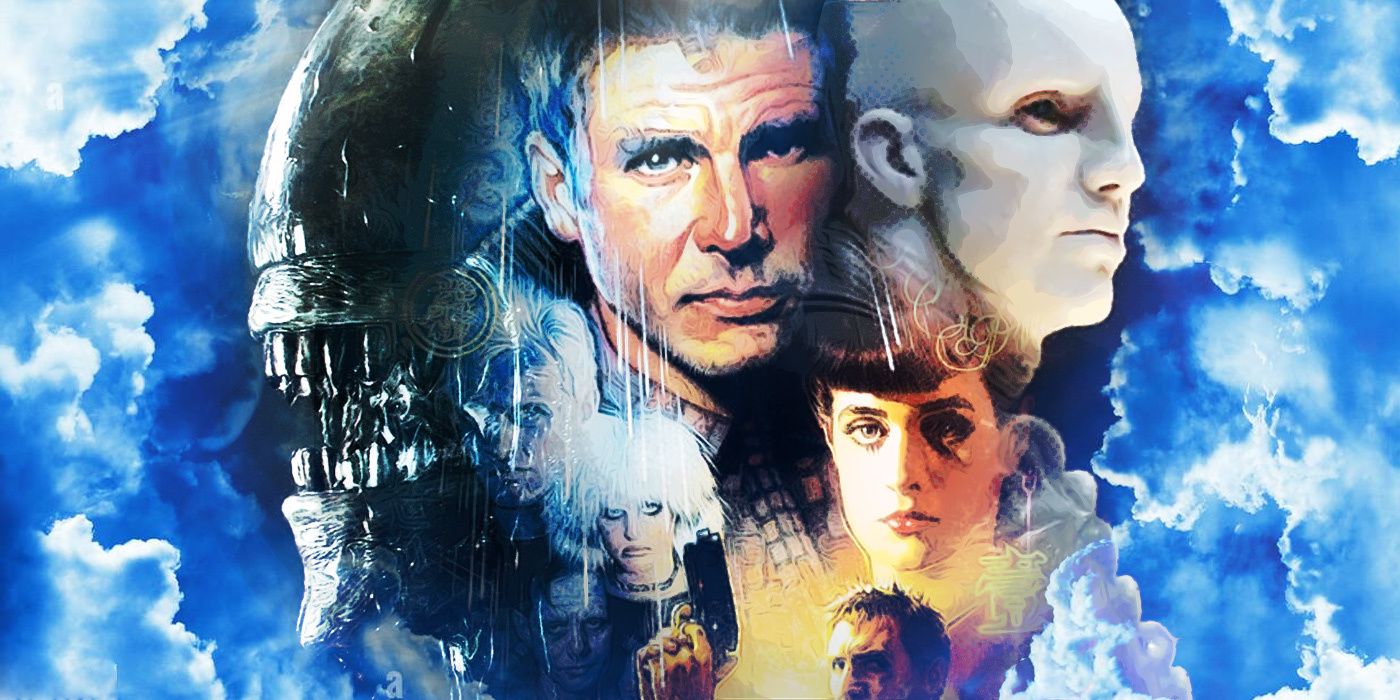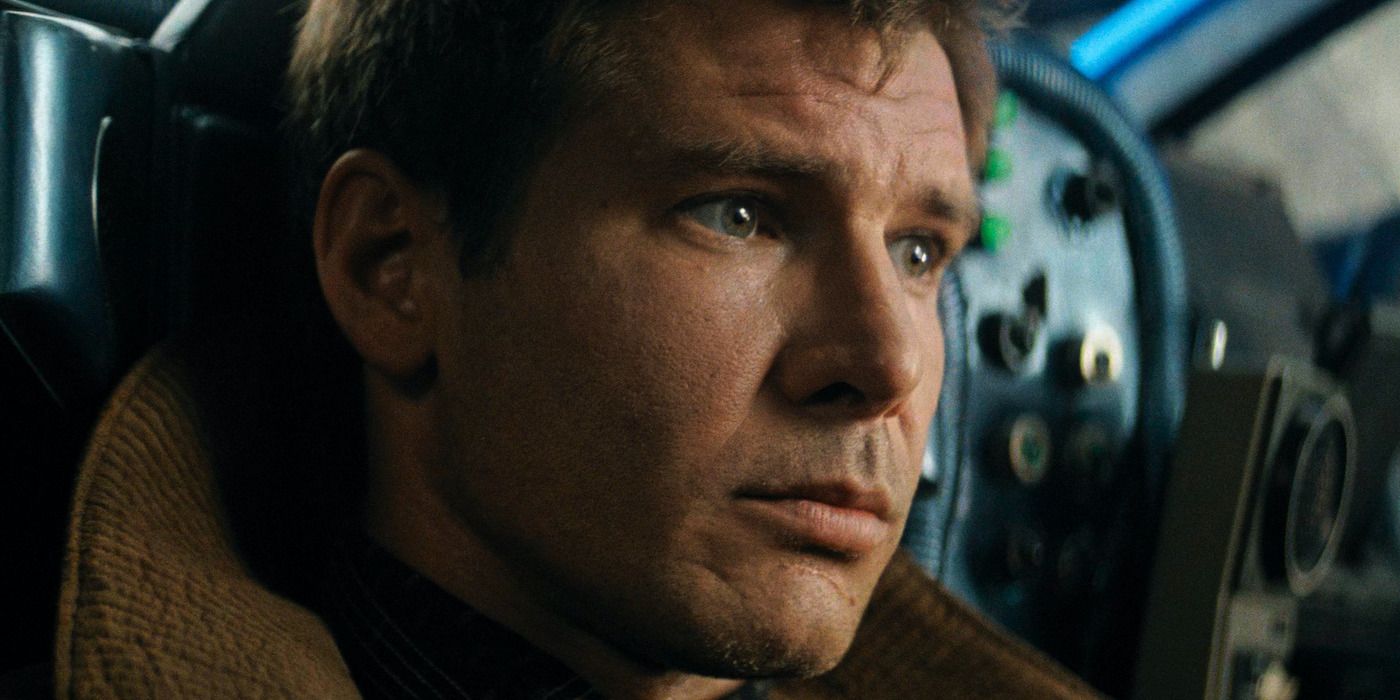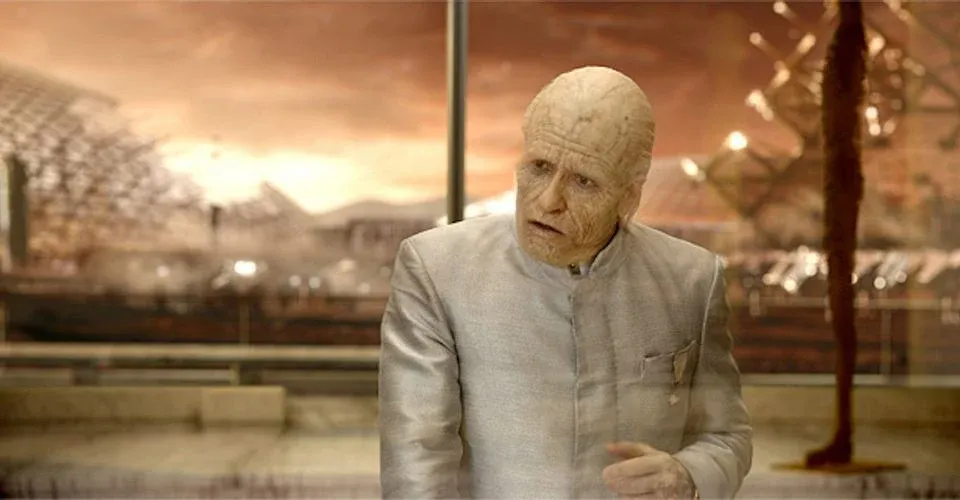In human history, from developing to advanced civilizations, there is a throughline of curiosity about life after death and the existence of omnipotent beings. A reoccurring component of existential art in ancient and contemporary works focuses on humans’ obsession with creation and destruction. This motif explores how creation is possibly a destructive act and how humanity’s fear of death may outweigh the satisfaction of life. The horror of death can result in narcissistic motivations to expand life in the search for immortality, this fear manipulates groups to consolidate power and create oppressive systems of obedience. The science fiction cinematic genre often expertly unpacks these destructive ideologies through a futuristic lens. Complex and patriarchal ideologies that embody these hegemonic powers include: religions, autocracies, and more recently, corporatocracies. There are few better explorations of humankind's deadly search for immortality and God than Ridley Scott’s Alien, Blade Runner, and Prometheus.
Critiques of Scott’s more conceptual projects often point to a lack of transparency about how the viewer is supposed to think and feel. It’s reductive to refer to his work as a frustrated man pushing buttons, or an atheist filmmaker trying to give unsolicited thoughts about society. His curiosity in the way humankind has evolved, migrated, gathered, institutionalized, exploited, and destroyed our planet is not specific to an ideology or some contrarian complex. In fact, his films often act as a barometer of how indoctrinated viewers are by their ideologies. Specifically, through the lens of three thematic heavyweights, we can analyze what his goals are in confronting his films’ audience. While there are countless writers, cinematographers, editors, composers, set designers, and other crucial cast and crew members that create these films, Scott’s choice to be the auteur of these three productions deserves an analysis. We’ll highlight his obsession with human mortality and the search for God, by investigating: imperialism and capitalism in Alien, humanity and corporatocracy in Blade Runner, and immortality in Prometheus.
Beginning with 1979s Alien, we’re introduced to a looming, cold machine that resembles an oil rig, floating through a lifeless space. Inside this machine is an incredibly narrow, mechanical, and bleak environment. The Nostromo is an interstellar commercial hauler with 20,000,000 tons of poached mineral ore from a colonized planet with seven travelers (and a cat) in cryosleep. The crew is contracted to maintain and repair the eerie piece of profitable machinery on its way back to Earth. After a distress signal from an unknown planet wakes the crew from cryosleep, they argue what their contractual responsibilities are with their company Weyland-Yutani (modern day Musk-Bezos?), as they aren’t paid as a rescue ship. Ash (Ian Holm), a Weyland-Yutani operative and android (unbeknownst to the crew), establishes that all contracts will forfeit their shares if they don’t investigate possible intelligent life. The Nostromo lands on LV-426 only to uncover the real resource and weapon the company wants: the Xenomorph. An apex predator who inevitably leads to the destruction of the Nostromo and everyone on board, except the highly resourceful Ellen Ripley (Sigourney Weaver), who inevitably escapes with Jonesy the cat. This sci-fi horror delivers as a claustrophobic and dreadful nightmare in space, but also as an oddly powerful advertisement for labor unions.
Weyland-Yutani’s Nostromo, MU-TH-UR 6000 (AI mainframe), and Ash, are all emotionless forces incapable of empathy that work to manipulate the crew for the pursuit of a megacorporation's power. Scott utilizes these symbolic, mechanical properties as stand-ins for the company. The Nostromo and its MU-TH-UR work against the crew as the machines hide information and create obstacles for the crew's survival. Ash believes humans are inefficient and the Xenomorph represents perfection, mirroring the consciousness of his corporate creators when speaking about the murderous alien: “I admire its purity. A survivor... unclouded by conscience, remorse, or delusions of morality.” The company's obsession to weaponize the Xenomorph and colonize other planets represents how powerful entities can use predatory systems to infect and violate humankind. Each machine reflects its creator's shallow corporate greed with imperialistic motivations. The bleak reality of hypercapitalism and labor exploitation is the throughline of the film. The five dead human crew members become an expendable lower class, and eventually lose their lives to the Xenomorph because of their inequitable contracts with Weyland-Yutani. Scott’s analysis of power-hungry ideologies and systems in Alien begins his journey of examining the creators of parasitical establishments and what their motives are.
In 1982s Blade Runner, Scott continues his investigation of corporatocracies and the individuals who control them, as he seeks to better understand their obsession with creation, humanity, and immortality. Philip K. Dick’s novel “Do Androids Dream of Electric Sheep?” is the inspiration for Blade Runner, but they don’t necessarily share the same central claim. The novel focuses on an environment clouded by radioactive dust after world wars and ecological disasters. The story’s thesis examines inequitable social hierarchies through the lens of enslaved androids. Both the novel and Blade Runner focus on dystopias fueled by hypercapitalism, but where the text mainly deals with hierarchies and slavery, the film asks something a bit more conceptual: What does it mean to be human?
The film follows an exhausted special agent of the LAPD Rick Deckard (Harrison Ford) in an urban setting covered with heavily lit advertisements and perpetual rainfall. The grime and chaotic landscape evoke paranoia and isolation. A postmodern setting so grim and materialistic that it forces you to question your own humanity. The audience's awareness of the tone and environment is essential to understanding society’s reliance on corporatocractic powers in this dystopian world.
An agitated Deckard is reluctantly assigned to hunt down a group of replicants who escape slavery from a nearby colony. A replicant is a genetically engineered and bio-enhanced life form, basically a superhuman who is indoctrinated to believe they were made to be exploited. Their creators are the Tyrell corporation, an insidious company that attempts to rebrand slavery as ethical, as they argue that replicants aren’t human. As Deckard studies the escaped replicants and speaks to their creator Dr. Eldon Tyrell (Joe Turkel), the infamous Deckard journey begins with what is real versus artificial when he falls in love with Tyrell’s manufactured replicant Rachael (Sean Young). Soon after, Tyrell, a god-like caricature, is killed by the escaped replicants, in an eerily religious scene where Tyrell states that Roy Batty (Rutger Hauer) is the “prodigal son”. Both Deckard and Rachael share complex, irrational beliefs about differences between replicants and humans. It's not until Deckard finally hunts down the replicants and has his final battle with the seemingly evil Batty that he questions his own prejudice that replicants are less than. As Deckard is about to fall to his death, Batty saves him, proof for Deckard that replicants have empathy - a human quality.
By the end of the film, Deckard and Rachael seem to accept that both organic and engineered humans are effectively: human. So, to resolve decades of Deckard debate, yes, he’s probably a replicant, but why should that make him any less human? The point of Deckard, and possibly every person in Blade Runner, being both replicant and human is vital to understand the greater themes of humanity. This is a story illustrating the most surreal, elevated dystopia for humankind. A postmodern society where consumerism is religion and a human is god: all humans and replicants are constructs and commodities, free will is an afterthought, propaganda is news, slavery apologists are your friends, and the man who monopolizes your reality has a messiah-complex. Scott’s choice to transition from consequences of industrial imperialism and hypercapitalism in Alien into corporatocractic control of humanity in Blade Runner is paramount to understanding his journey as a filmmaker deconstructing power-hungry men. While many have spent their lives debating the Deckard-replicant question, the larger riddle that stunts Scott is evident in his next thematic masterpiece Prometheus: Is all of man's endeavors to accumulate resources and maximize growth a ploy to become God?
Prometheus asks compelling philosophical questions about the human condition and the origins of humans growth-obsessed goals. The film begins as Dr. Elizabeth Shaw (Noomi Rapace) and Charlie Holloway (Logan-Marshall Green) lead an expedition to find humankind's creators (engineers). The Weyland corporation (yes, that is the very same Weyland from Alien) funds the mission and gathers a crew of scientists, interstellar laborers, and the curious but devious android David (Michael Fassbender). From there on, chaos ensues and crew members die because of a mysterious black goo that infects the crew. The black goo killing the Prometheus crew purposely resembles the Xenomorph killing the Nostromo crew in Alien. As the third act begins, we find that Peter Weyland (Guy Pearce) has been kept alive to meet his maker and that the engineers have a plan to commit genocide to humankind. Weyland soon takes some remaining crew, including Shaw and David, to find the God he’s been searching for. His God complex is almost satisfied when he awakes the engineer. Weyland, in his final moments, speaks through David and asks the engineer for the key to immortality. He believes he deserves immortality because David (AI), is an evolution of humankind and can live forever - making Weyland a God himself. In a desperate plea, Shaw demands to know why the engineers want to kill humankind, before being attacked by one of the crew to stop talking. The engineer is furious, not just because of Weyland’s ego and his petty creation in David, but by the lack of humanity in front of him. After the engineer tries to kill them both, Weyland in his dying breath mutters to David: “There’s nothing.” in which David confidently responds with his mic drop: “I know. Have a good journey, Mr. Weyland.”
The juxtaposition of Weyland’s shallow desire for immortality and Shaw’s naive desire for humans to have a greater purpose is the saddest irony of all three films. Scott’s Prometheus draws parallels between extreme ideologues who believe humans have a deeper purpose, from exploitative capitalists to religious zealots. The paradoxical debates about the value of 2012s Prometheus is understandable, especially if you include this film in Scott’s complex forty-year thematic journey with the Alien and Blade Runner franchises. It's unclear whether Prometheus is a sequel to Blade Runner or a prequel to Alien, possibly somewhere in between. Regardless, critics and audiences are divided on the film’s quality and whether its deeper theme is too ambiguous. There are criticisms that Prometheus is idiotic sci-fi garbage that feeds off leftover nostalgia from Alien, but also, there are praises that believe Prometheus is a visual and thematic masterpiece that argues self-obsessed humans' deepest desire is to take God’s power and become immortal. Ironically, you could argue that both takes are simultaneously true. Prometheus serves to ask essential questions about whether humans have any intrinsic value and if anyone actually deserves anything. Its answer: stop searching for God and take a look around.
Ridley Scott’s meticulous investigation of the roots of exploitative ideologies and how they stunt humankind is a gargantuan task, and he succeeds in coming closer through genre filmmaking than any other director's filmography. Scott’s mission through these three films is encapsulated by this quote from Peter Weyland, who resembles many tech-giants today: “At this moment of our civilization, we can create cybernetic individuals, who in just a few short years will be completely indistinguishable from us. Which leads to an obvious conclusion: we are the gods now.”




